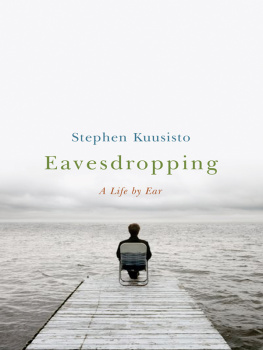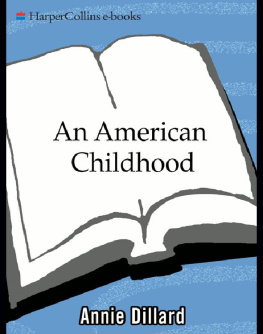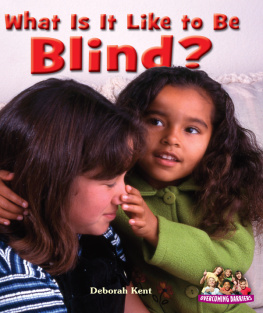
ALSO BY STEPHEN KUUSISTO
Planet of the Blind: A Memoir
Only Bread, Only Light: Poems
The Poets Notebook: Excerpts from the Notebooks of Contemporary American Poets
(coedited with Deborah Tall and David Weiss)

For Connie
In order to create there must be a dynamic force, and what force is more potent than love?
IGOR STRAVINSKY

A few years ago I wrote a memoir entitled Planet of the Blind. In that book I described growing up with a visual impairment in the late fifties and sixties. I was lonely as a child and lived in rural New Hampshire, Finland, and western New York, locales that compounded the isolation of blindness. Like many children with disabilities, I was eager to be a part of the world around me and capable of denial if denying my blindness allowed me to join in the activities of normal children. I simply lowered my head and ran forward into the patterns of light and shade that make up my kind of vision loss. This was not an ideal way to live but at least I was unsupervised and on the street in an era when that posture wasnt customary for disabled children.
Happily I no longer crave recognition as a sighted person. At fifty Ive learned how to be as much of myself as possible. Like many others before me, I learned some of this acceptance from an exceptional dog. In 1994, when I was thirty-nine, I went to Guiding Eyes for the Blind, one of Americas premier guide-dog training schools, and there I was paired with my first guide dog, Corky, a yellow Labrador retriever. Corky knew instinctively how to live in the world, and walking beside her I experienced a new delight in traveling. Together we visited hundreds of cities: invisible cities, as Italo Calvino would say. Corky watched the traffic in Milan, San Francisco, New Orleans, or Venice, and I did all the listening.
It was during a visit to Boston with Corky that the scheme for this book first occurred to me. I had just delivered a talk to blind people at the Carroll Centera nonprofit agency which assists people with visual impairments. I had been talking about the pleasures and advantages of navigating with a guide dog and we had arrived at the question-and-answer period. There were about a dozen folks in the audience, all of them newly blind, and most of the questions were about how to apply for a guide dog or how walking with a dog differs from traveling with a white cane. Suddenly a woman called out from the back of the room. Her voice was fierce. Why travel anywhere if you cant see? she asked. Her words seemed to linger in the air. I tried to ask her questions to defuse the awkwardness of the moment. This woman was in her mid-fifties; shed gone blind from diabetes; her husband had recently passed awayher question was complex and it had a good deal to do with faith. What would the future hold? What is the use of going forward? Without eyesight arent we selfless in the worst sense? How can one live in a world without independence or the daily therapy of sight-seeing?
My answer was too quick. I said that one can hear baroque music in Venice or dine on softshell crabs in Baltimore. I think I also said something about the good endorphins of a brisk mornings walk. But I knew as we wrapped things up that I hadnt answered her question.
Veteran blind people know that its possible to sight-see by ear, for we do it all the time. Alone in unfamiliar hotel lobbies, we survey our surroundings and hear in the ambient curves of architecture a hundred oddities. We hear the movements of strangers; hear their laughter; hear pennies dropped in the Hiltons fountain; the bristles of a shoeshine brush; the wings of a pigeon that has made its way indoors. The blind hear all this while theyre locating the chiming bells of the elevators.
Blindness often leads to compensatory listening (if one has the fortune of a hearing life). In Planet of the Blind I describe how I listened to teachers when I was a small boy and developed an auditory version of what was happening around me. Unable to see the chalkboard or read a standard book, I learned by necessity how to hear both for content and splendor.
I used the term compensatory listening just now but I could substitute creative listening. Blind people are not casual eavesdroppers. We have method. As things happen around us we reinvent what we hear like courtroom artists who sketch as fast as they can. We are also cartoonists of a sort: our sketches are both clear and improbable. I am essentially an inept landscape painter. I draw unlikely trees and mechanical people in the manner of Max Ernst. In reality I cannot see the world by ear, I can only reinvent it for my own purposes. But admitting this may make me lucky. I am free to daydream for survival or amusement. Even when I listen to Manhattan traffic Im drawing my own pictures of New Yorkthe streets are crowded with Russian ghosts and wheels that have broken loose from their carriages.
After my trip to Boston I wondered what a book about living or traveling by ear might be like. It would, I realized, probably develop without a dramatic scenario. Knowing and savoring the world by ear is really an impressionistic subject. Was it possible to write a memoir about what my ears know? Such a book would have to contain what the poet Wallace Stevens called the pleasures of merely circulating. It would have to be a collection of auditory postcards or tone poems. This is how I navigate the world. I enter unfamiliar environments and I listen with everything I have, finding inchoate music in what happens around me. As I considered this I remembered that the Finnish composer Sibelius wrote tone poems for the orchestra. He envisioned them as musical paintings, impressionistic paintings that would remind his countrymen how mysterious and beautiful the world really was.
Even though a lyric style has its virtues, there are some things the reader of this book might want to know, particularly if he or she hasnt read Planet of the Blind. The most important matter may have to do with how blind people see. My own version of blindness is known as retinopathy of prematurity. Children who are born prematurely can, in some instances, have damaged retinas. Blind people who have this condition often see the world in fragments. One sees like a myopic, darting minnow. This kind of seeing is both beautiful and worrisome. Many additional forms of blindness also produce these sorts of effects. People with macular degeneration see shifting islands of darkness and jumping apertures of sight. Diabetic retinopathy leaves one in a field of muddy light. Cataracts are like having Vaseline in your eyes. In any event the majority of blind people see small glimpses of the world, though these views are inaccurate. That the blind see anything at all is, however, often surprising to many people.
It is also helpful to know that I was ashamed of my disability throughout my childhood and this sadness was compounded by my mothers militant refusal to use the words blind or blindness. In the early sixties disabled children did not attend public schools and my mother insisted that I should receive a public education. Accordingly I became a soldier of denial and lived in nervous self-absorption. The Americans with Disabilities Act was thirty years away in an unimaginable future. My job was to live in the open without words for my circumstances. This is not an uncommon tale, as many people with disabilities will tell you.
Next page






